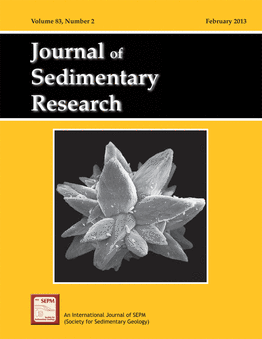
JOURNAL OF SEDIMENTARY RESEARCH
Scope & Guideline
Unveiling the Secrets of Earth's Layers
Introduction
Aims and Scopes
- Sediment Transport Dynamics:
Research on the mechanisms and processes involved in the movement of sediment through various environments, including rivers, lakes, and coastal areas. This includes studies on sediment yield, transport modeling, and the effects of hydrodynamic conditions. - Sediment Quality and Contamination:
Investigations into the chemical and physical properties of sediments, including the presence of heavy metals, organic pollutants, and their ecological impacts. This area also encompasses assessments of sediment quality in relation to anthropogenic activities. - Geomorphology and Sedimentary Processes:
Studies that explore the shaping of landscapes through sedimentation and erosion processes, including the impacts of natural and human-induced changes on sedimentary environments. - Innovative Methodologies in Sediment Research:
Development and application of new techniques and technologies for sediment analysis, including remote sensing, numerical modeling, and machine learning approaches. - Ecohydraulics and Sediment Management:
Research focused on the interactions between ecological systems and sediment transport, including the management of sediment in relation to aquatic habitats and biodiversity. - Paleoenvironmental Reconstruction:
Use of sedimentological data to infer historical environmental conditions and changes, which can provide insights into past climate and geological events.
Trending and Emerging
- Machine Learning and AI in Sediment Research:
The integration of artificial intelligence and machine learning techniques for modeling sediment transport and predicting sediment dynamics is on the rise, offering new avenues for data analysis and interpretation. - Climate Change Impact Studies:
Research focused on the effects of climate change on sediment transport and geomorphological processes is gaining traction, highlighting the urgency of understanding these interactions in a changing environment. - Sediment-Water Interactions:
There is an increasing emphasis on the interactions between sediments and water quality, particularly regarding nutrient cycling and pollutant transport in aquatic systems. - Holistic Ecosystem Approaches:
Emerging studies are adopting a more holistic view of sediment dynamics, considering not just physical processes but also ecological impacts and the role of vegetation in sediment stability. - Sediment Management and Restoration Practices:
Research is trending towards practical applications in sediment management and restoration, focusing on sustainable practices that mitigate erosion and enhance ecosystem health.
Declining or Waning
- Traditional Grain Size Analysis:
While grain size analysis remains relevant, there is a noticeable shift towards more complex modeling and analytical techniques that incorporate multiple sediment characteristics beyond just size. - Single-Factor Sediment Studies:
Research focusing solely on isolated factors influencing sediment dynamics is decreasing. There is a growing trend towards integrated studies that consider multiple interacting variables and holistic approaches. - Static Sediment Quality Assessments:
Static assessments of sediment contamination are being overshadowed by dynamic studies that examine sediment quality changes over time and in response to environmental factors. - Laboratory-Based Experimental Studies:
Although laboratory experiments are foundational, there is a declining emphasis on isolated laboratory studies in favor of field-based research that reflects real-world complexities. - Localized Case Studies:
Research that focuses on highly localized sediment studies without broader implications or connections to global sedimentary processes is becoming less common as researchers aim for findings with wider applicability.
Similar Journals
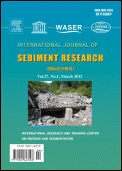
International Journal of Sediment Research
Innovating Insights in Sedimentology and StratigraphyThe International Journal of Sediment Research, published by KEAI PUBLISHING LTD, stands as a premier platform for advanced studies in the fields of geology and stratigraphy. With an impressive Q1 ranking in both categories in 2023, this journal hosts a wealth of research that has significantly contributed to our understanding of sediment dynamics and geological processes since its inception in 1981. The journal is dedicated to publishing high-quality research articles, reviews, and case studies that span a broad range of topics, including sedimentology, stratigraphic analysis, and environmental geology. Researchers, professionals, and students will find invaluable insights within its pages, courtesy of cutting-edge methodologies and rigorous peer-review standards. Despite its non-open access status, the journal ensures a global reach, facilitating knowledge sharing and collaboration among academia and industry. With a rich history and a forward-looking approach to scientific exploration, the International Journal of Sediment Research remains a vital resource for those committed to advancing our understanding of Earth's sedimentary systems.
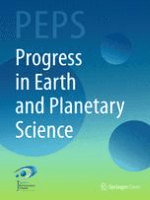
Progress in Earth and Planetary Science
Catalyzing global discourse in Earth and planetary studies.Progress in Earth and Planetary Science is a premier open-access journal published by Springer, dedicated to advancing the field of Earth and planetary sciences. Since its inception in 2014, this journal has emerged as a prominent platform, achieving a Q1 ranking in the Earth and Planetary Sciences category, reflecting its high impact and rigorous peer-review process that ensures the highest quality of published research. With its broad scope encompassing diverse subfields within the Earth sciences, the journal aims to foster interdisciplinary collaboration and innovation among researchers, professionals, and students. The journal's commitment to accessibility through its open access model promotes the dissemination of knowledge globally, allowing critical research findings to be shared widely within the scientific community. Located in the United Kingdom, Progress in Earth and Planetary Science continues to play an essential role in shaping the future of Earth and planetary research from 2014 to 2024 and beyond.
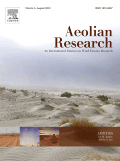
Aeolian Research
Advancing Knowledge on Wind-Driven Earth ProcessesAeolian Research, published by ELSEVIER SCI LTD, is a leading academic journal in the fields of Earth-Surface Processes and Geology, holding a prestigious Q1 category ranking in both disciplines as of 2023. With an ISSN of 1875-9637 and an E-ISSN of 2212-1684, this journal is pivotal for researchers and scholars interested in the intricate dynamics of aeolian processes and their implications for geology and environmental science. Covering a span of research from 2009 to 2024, it regularly disseminates high-impact studies that explore the interactions between wind-driven processes and sediment transport, erosion, and landscape evolution. With a Scopus ranking of #34 and #20 in their respective categories, Aeolian Research serves as an essential resource for advancing knowledge in Earth and Planetary Sciences. While currently not an open-access journal, it delivers compelling insights that are relevant to contemporary challenges in geology and environmental management.

Journal of Sedimentary Environments
Unveiling the Secrets of Sedimentary Environments.Journal of Sedimentary Environments is a leading open-access publication dedicated to advancing the study of sedimentary processes and environments. Published by SPRINGER HEIDELBERG, this journal embraces a wide array of topics including sedimentology, paleoenvironments, and the interactions between sediments and ecosystems. Since its transition to open access in 2016, it has prioritized making high-quality research widely available, fostering collaboration and innovation among researchers, professionals, and students in the field. With a commitment to excellence, the journal aims to publish groundbreaking studies that enhance our understanding of sedimentary environments, making it an essential resource for anyone interested in the dynamics of Earth’s sedimentary systems. Located in Heidelberg, Germany, this journal is poised to play a vital role in shaping current and future research discussions worldwide.

DOKLADY EARTH SCIENCES
Fostering Collaboration in Earth and Planetary DiscoveriesDOKLADY EARTH SCIENCES is a reputable journal published by MAIK NAUKA/INTERPERIODICA/SPRINGER, focusing on the dynamic field of Earth and Planetary Sciences. With an ISSN of 1028-334X and E-ISSN 1531-8354, this journal offers a platform for researchers to disseminate their findings and insights that contribute to our understanding of Earth systems over a continuous publishing span from 1998 to 2024. It currently holds a Q3 quartile ranking in the Earth and Planetary Sciences category, reflecting an emerging yet significant impact within its field, evidenced by its Scopus ranks where it stands at 123rd in general Earth sciences and 113th in miscellaneous Earth sciences. DOKLADY EARTH SCIENCES aims to bridge research gaps and foster collaboration among a diverse audience including researchers, professionals, and students committed to advancing knowledge in geoscience. The journal stands as a vital resource for those seeking to explore contemporary challenges and innovations within the realm of Earth sciences.
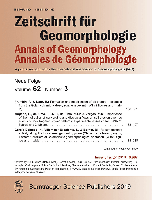
ZEITSCHRIFT FUR GEOMORPHOLOGIE
Advancing Knowledge in Geomorphological Processes.ZEITSCHRIFT FUR GEOMORPHOLOGIE is a prestigious journal dedicated to the field of geomorphology, published by GEBRUDER BORNTRAEGER from Germany. With the ISSN 0372-8854 and E-ISSN 1864-1687, this journal serves as a vital platform for researchers, professionals, and students interested in understanding the dynamic processes that shape our Earth’s surface. The journal has consistently maintained a solid academic reputation, achieving a Q3 ranking in key categories including Earth and Planetary Sciences (miscellaneous), Earth-Surface Processes, and Geography, Planning and Development as of 2023. This reflects its position within the global scientific community; ranked at #93 out of 179 in Earth-Surface Processes, contributing to crucial discussions surrounding environmental changes and landform evolution. Although ZEITSCHRIFT FUR GEOMORPHOLOGIE is not an Open Access publication, it offers extensive insights and findings from converged years spanning from 1979 to 2019 and again from 2021 to 2022. The journal is located at Johannesstr 3A, D-70176 Stuttgart, Germany, and plays a pivotal role in advancing geomorphological research that impacts natural sciences, ecology, and planning strategies worldwide.

JOURNAL OF IBERIAN GEOLOGY
Unveiling the intricate layers of Iberian geological phenomena.JOURNAL OF IBERIAN GEOLOGY, published by Springer International Publishing AG, is a pivotal platform dedicated to advancing the field of geology and stratigraphy. With an ISSN of 1698-6180 and E-ISSN of 1886-7995, this journal has earned its reputation in the academic community, holding a commendable Q2 ranking in both Geology and Stratigraphy for 2023, reflecting its contributions to contemporary geological research. Spanning from 2007 to 2024, it provides a comprehensive forum for scholars and practitioners from around the globe to disseminate their findings pertaining to the Iberian Peninsula, enhancing the understanding of regional geological phenomena. The journal has carved out a significant niche within the Earth and Planetary Sciences, ranking #137 out of 321 in Geology and #24 out of 55 in Stratigraphy, indicating its wide-reaching impact and scholarly engagement. The Journal of Iberian Geology serves as an indispensable resource for those interested in the complexities of geological structures, stratigraphic sequences, and the broader implications of geological research, making it a vital reference for researchers, professionals, and students alike.
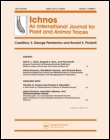
ICHNOS-AN INTERNATIONAL JOURNAL FOR PLANT AND ANIMAL TRACES
Illuminating Evolution: Where Fossils Tell Their StoriesICHNOS: An International Journal for Plant and Animal Traces is a premier scholarly journal published by Taylor & Francis Inc, focusing on the intricate field of paleontology. With an ISSN of 1042-0940 and an E-ISSN of 1563-5236, this journal serves as a vital platform for the dissemination of high-quality research centered on the traces left by plants and animals throughout geological history. Established in 1990 and with a convergence period extending to 2024, ICHNOS holds a Q3 category ranking in Paleontology according to the 2023 quartiles, positioning it within the 48th percentile of its Scopus-rank peer group. Although it does not currently offer Open Access options, the journal remains a valuable resource for researchers and professionals seeking to deepen their understanding of trace fossils and their implications for paleoecological studies. By contributing critical insights into the evolutionary chronicle of life on Earth, ICHNOS plays an essential role in advancing the dialogue within the earth and planetary sciences community.

SEDIMENTOLOGY
Advancing the frontiers of sedimentary science.SEDIMENTOLOGY (ISSN: 0037-0746, E-ISSN: 1365-3091) is a premier journal published by Wiley in the United Kingdom, dedicated to advancing the scientific understanding of sedimentary processes, depositional environments, and the broader implications for stratigraphy and geology. With an impressive impact factor that places it in the prestigious Q1 category within both geology and stratigraphy, SEDIMENTOLOGY ranks among the top journals in its field, with Scopus rankings of #3 in Stratigraphy and #20 in Geology, reflecting its significant influence and the high-quality research it publishes. This journal, which conceives high-impact research contributions from 1962 to 2024, serves as an essential resource for researchers, professionals, and students alike, fostering a deeper exploration of sedimentary systems and providing a forum for the dissemination of novel findings. Although not open access, articles published in SEDIMENTOLOGY are critical for enhancing our understanding of sedimentation dynamics, which have far-reaching implications for natural resource management and environmental assessments.

GEO-MARINE LETTERS
Shaping the Future of Geotechnical and Environmental EngineeringGEO-MARINE LETTERS, published by Springer, is a prestigious academic journal that has been a pivotal platform for the dissemination of innovative research in the fields of Earth and Planetary Sciences, Oceanography, Environmental Science, and Geotechnical Engineering since its inception in 1981. With an E-ISSN of 1432-1157, this journal has established itself in the Q2 quartile across multiple categories in 2023, indicating its influential position within the scientific community, as reflected by its Scopus rankings. While it currently does not offer an open access option, its rigorous peer-review process ensures the publication of high-quality research that contributes significantly to advancing our understanding of marine and geological sciences. Researchers, professionals, and students alike will benefit from the diverse scope of studies featured in GEO-MARINE LETTERS, making it an essential resource for those engaged in environmental and marine research. Situated in Germany, the journal's commitment to excellence continues to shape critical discussions and innovations in the field.